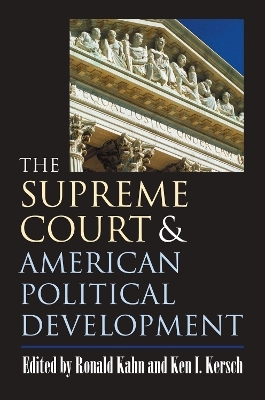
The Supreme Court and American Political Development
Seiten
2006
University Press of Kansas (Verlag)
978-0-7006-1439-4 (ISBN)
University Press of Kansas (Verlag)
978-0-7006-1439-4 (ISBN)
- Lieferbar (Termin unbekannt)
- Versandkostenfrei innerhalb Deutschlands
- Auch auf Rechnung
- Verfügbarkeit in der Filiale vor Ort prüfen
- Artikel merken
Explores the evolution of constitutional doctrine as elaborated by the Supreme Court. Moving beyond the traditional ""law versus politics"" perspective, the authors draw on studies in American Political Development (APD) to present a complex view of the Court as both a legal and political entity.
This innovative volume explores the evolution of constitutional doctrine as elaborated by the Supreme Court. Moving beyond the traditional ""law versus politics"" perspective, the authors draw extensively on recent studies in American Political Development (APD) to present a much more complex and sophisticated view of the Court as both a legal and political entity. The contributors - including Pam Brandwein, Howard Gillman, Mark Graber, Ronald Kahn, Tom Keck, Ken Kersch, Wayne Moore, Carol Nackenoff, Julie Novkov, and Mark Tushnet - share an appreciation that the process of constitutional development involves a complex interplay between factors internal and external to the Court. They underscore the developmental nature of the Court, revealing how its decision-making and legal authority evolve in response to a variety of influences: not only laws and legal precedents, but also social and political movements, election returns and regime changes, advocacy group litigation, and the interpretive community of scholars, journalists, and lawyers. Initial chapters reexamine standard approaches to the question of causation in judicial decision-making and the relationship between the Court and the ambient political order. Next, a selection of historical case studies exemplifies how the Court constructs its own authority as it defines individual rights and the powers of government. They show how interpretations of the Reconstruction amendments inform our understanding of racial discrimination, explain the undermining of affirmative action after Bakke, and consider why Roe v. Wade has yet to be overturned. They also tell how the Court has collaborated with political coalitions to produce the New Deal, Great Society, and Reagan Revolution, and why Native Americans have different citizenship rights than other Americans. These contributions encourage further debate about the nature and processes of constitutional change.
This innovative volume explores the evolution of constitutional doctrine as elaborated by the Supreme Court. Moving beyond the traditional ""law versus politics"" perspective, the authors draw extensively on recent studies in American Political Development (APD) to present a much more complex and sophisticated view of the Court as both a legal and political entity. The contributors - including Pam Brandwein, Howard Gillman, Mark Graber, Ronald Kahn, Tom Keck, Ken Kersch, Wayne Moore, Carol Nackenoff, Julie Novkov, and Mark Tushnet - share an appreciation that the process of constitutional development involves a complex interplay between factors internal and external to the Court. They underscore the developmental nature of the Court, revealing how its decision-making and legal authority evolve in response to a variety of influences: not only laws and legal precedents, but also social and political movements, election returns and regime changes, advocacy group litigation, and the interpretive community of scholars, journalists, and lawyers. Initial chapters reexamine standard approaches to the question of causation in judicial decision-making and the relationship between the Court and the ambient political order. Next, a selection of historical case studies exemplifies how the Court constructs its own authority as it defines individual rights and the powers of government. They show how interpretations of the Reconstruction amendments inform our understanding of racial discrimination, explain the undermining of affirmative action after Bakke, and consider why Roe v. Wade has yet to be overturned. They also tell how the Court has collaborated with political coalitions to produce the New Deal, Great Society, and Reagan Revolution, and why Native Americans have different citizenship rights than other Americans. These contributions encourage further debate about the nature and processes of constitutional change.
Ronald Kahn is James Monroe Professor of Politics and Law and Director of the Law and Society Program at Oberlin College and author of The Supreme Court and Constitutional Theory, 1953-1993. Ken I. Kersch is assistant professor of politics and a member of the executive committee of the James Madison Program in American Ideals and Institutions at Princeton University. He is the author of Constructing Civil Liberties: Discontinuities in the Development of American Constitutional Law.
| Verlagsort | Kansas |
|---|---|
| Sprache | englisch |
| Maße | 155 x 228 mm |
| Gewicht | 764 g |
| Themenwelt | Geschichte ► Teilgebiete der Geschichte ► Militärgeschichte |
| Recht / Steuern ► Allgemeines / Lexika | |
| Recht / Steuern ► EU / Internationales Recht | |
| Recht / Steuern ► Rechtsgeschichte | |
| Sozialwissenschaften ► Politik / Verwaltung | |
| ISBN-10 | 0-7006-1439-7 / 0700614397 |
| ISBN-13 | 978-0-7006-1439-4 / 9780700614394 |
| Zustand | Neuware |
| Informationen gemäß Produktsicherheitsverordnung (GPSR) | |
| Haben Sie eine Frage zum Produkt? |
Mehr entdecken
aus dem Bereich
aus dem Bereich
neueste Manipulationstechniken als Waffengattung der NATO
Buch | Softcover (2023)
Westend (Verlag)
24,00 €
Deutschlands Schwäche in der Zeitenwende
Buch | Softcover (2023)
C.H.Beck (Verlag)
18,00 €


